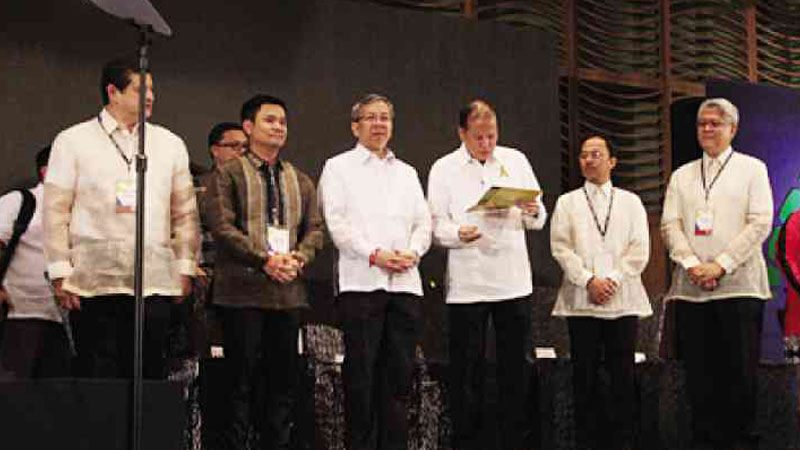Filipino musicians move to revitalize their ailing industry

AT THE SUMMIT (from left): Sen. Teofisto Guingona III, Ogie Alcasid, Trade Secretary Gregory Domingo, President Aquino, Noel Cabangon and Ryan Cayabyab.
Following incisive reports and presentations by some of the local music scene’s most prominent figures at the recent Pinoy Music Summit, the participants—around 260—joined focus group discussions and drew up recommendations for creating a program meant to revitalize the ailing industry.
The major concerns identified were: lack of promotion for local music, the dominance of foreign music, piracy, weak enforcement of the equity program, the shift from traditional to digital media and the lack of legislation that protects and propels Filipino music.
In his closing remarks and summit synthesis, Filipino Society of Composers, Authors and Publishers (Filscap) president and conference director Noel Cabangon highlighted urgent plans of action to address the challenges.
Next step
Article continues after this advertisement
Among the proposals: specific training and education for artists and other industry members, broader networking here and abroad, lobbying for more effective government support, optimization of new media, protection of indigenous and traditional music and formation of an umbrella group that will implement an “OPM (Original Pilipino Music) roadmap.”
Article continues after this advertisementSince the recommendations were still general and rudimentary, Cabangon said he would set later this year another meeting of conference conveners to draft a more comprehensive plan.
“We should ‘operationalize’ [these discussions], otherwise everything will be mere talk. It’s a big challenge, but at least we now know what we really want,” Cabangon told reporters during the event held on Wednesday at Landbank Plaza’s (Malate, Manila) Diosdado Macapagal Hall.
Spearheaded by Filscap, the summit’s other conveners were: Organisasyon ng mga Pilipinong Mang-aawit, Philippine Association of the Record Industry, Music Copyrights Administrators of the Philippines, Asosasyon ng Musikong Pilipino Foundation, Sound Recording Rights Society and the Philpop Music Fest Foundation.
The summit participants consisted of industry stakeholders—artists, songwriters, producers, publishers and representatives of record labels, television networks, radio stations and government agencies.
Asked what he thought was most feasible among the proposed measures on the table, Cabangon said it was to boost local music promotion and networking by mounting more music festivals around the country.
Crucial component
He acknowledged that government support, deemed the most crucial component of the initiative, was likely to take some time.
Cabangon told the Inquirer: “We can’t expect the government to give a commitment right away; [officials of agencies concerned] will have to study the measures we have drawn up and prepared for their contribution. Meanwhile, we have to immediately come up with clear-cut recommendations—be it for funds, infrastructure or legislation.”
Renowned composer and Philpop Foundation executive director Ryan Cayabyab concurred: “Changes don’t happen overnight.”
A day before the summit, Cabangon was with Ifugao Province Rep. Teodoro Baguilat Jr. when the latter filed House Bill No. 4218, or the OPM Development Act of 2014.
The bill aims “to provide promotion, protection and the development of the Philippine music industry.” Broken down: It seeks to institutionalize the playing of at least four original Filipino compositions every hour by radio stations, entitling those who comply to a tax credit. It requires visiting foreign artists to pay equity fees “equivalent to the amount that a Filipino artist would be charged, were he/she to perform in the country that said foreign performers are from.”
Not enforced
Cabangon pointed out that the existing Executive Order No. 255, passed by the late President Corazon C. Aquino in 1987, decreed the broadcast of four OPM songs per hour. However, he lamented, the EO is not fully enforced or followed. The same could be said of the performers’ equity program, which is bound by a memorandum of agreement signed in 1989.
“Though these measures are in place, they need to be institutionalized, to give them teeth,” Cabangon said. “It would greatly help our cause if these enactments became laws.”
Aside from the OPM Development Act of 2014, Sen. Teofisto Guingona III, in his talk during the summit, enumerated at least six similar bills filed earlier by Senators Grace Poe-Llamanzares, JV Ejercito, Lito Lapid, Jinggoy Estrada, Ramon “Bong” Revilla Jr. and Antonio Trillanes.
Legislative mill
Guingona said these initiatives were “going through the legislative mill process” which, he admitted could be “long-drawn and tedious.”
The senator vowed to help hasten the passage of these bills that are beneficial to the local music industry. “Once any of these bills reach the floor and a vote is called, I shall raise my hand in a resounding ‘yes’ vote,” said Guingona, adding that he acknowledged the industry’s aspirations to be part of the National Development Plan.
President Benigno Aquino graced the event as keynote speaker and commended the people who tirelessly work for the betterment of the industry. A confessed music lover, the President, in his address, discussed the power of music in uniting people.
Despite the problems that weigh down the industry, Aquino said, as long as talented musicians continue to create songs, and an appreciative audience listen to them, Filipino music would never die.
E-mail [email protected]